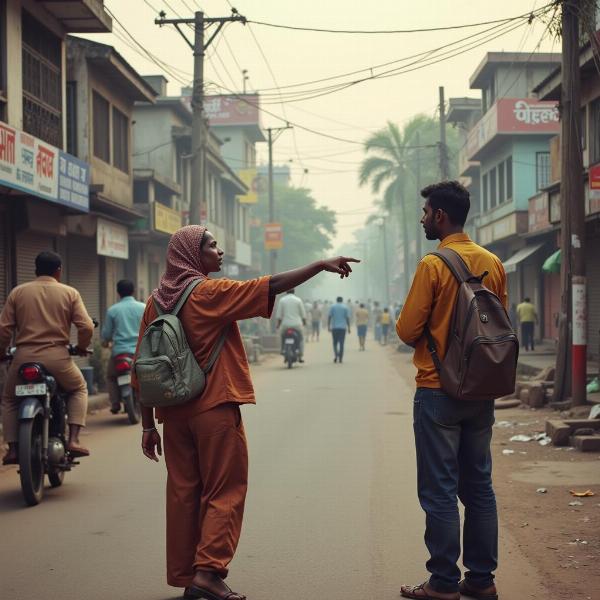Understanding the phrase “on your way” and its various meanings in Hindi is crucial for effective communication. Whether you’re giving directions, asking about someone’s progress, or simply checking in, knowing the right Hindi equivalent can make all the difference. This article explores the different ways to express “on your way” in Hindi, considering various contexts and cultural nuances.
Different Ways to Say “On Your Way” in Hindi
The Hindi translation of “on your way” depends heavily on the specific context. There isn’t one single perfect translation that fits every situation. Here are some common options:
-
रास्ते में (raste mein): This is the most literal translation and means “on the way” or “in the path.” It’s suitable for general inquiries about someone’s journey. For example, if you call a friend and ask, “Are you on your way?” you could say, “क्या आप रास्ते में हैं? (Kya aap raste mein hain?)”
-
आ रहे हैं/आ रही हैं/आ रहे हो (aa rahe hain/aa rahi hain/aa rahe ho): These phrases translate to “coming” and are used when someone is already en route to a specific destination. The correct form depends on the gender and formality of the person you’re speaking to. For instance, you might say to a female friend, “वह आ रही है? (Vah aa rahi hai?)” meaning “Is she on her way?”
-
निकल पड़े हैं/निकल पड़ी हैं/निकल पड़े हो (nikal pade hain/nikal padi hain/nikal pade ho): These expressions signify that someone has just started their journey. They imply a sense of having set out or embarked on their way. They are more emphatic than simply saying “coming.” For example, “मैं निकल पड़ा हूँ (Main nikal pada hun)” translates to “I’m on my way (I’ve just left).”
-
चल दिए हैं/चल दी हैं/चल दिए हो (chal diye hain/chal di hain/chal di ho): Similar to “nikal pade hain,” these phrases indicate that someone has departed and are often used interchangeably. However, they can also imply a slightly more hurried departure.
Choosing the Right Hindi Phrase
The best way to choose the appropriate Hindi phrase for “on your way” is to consider the context. Are you asking about someone’s general location during their journey? Or are you confirming that they have already departed? The nuance you want to convey will determine the most accurate translation.
For example, if someone is expected to arrive shortly, asking “क्या आप रास्ते में हैं? (Kya aap raste mein hain?)” might be suitable. But if you know they’ve already left, “निकल पड़े हैं? (Nikal pade hain?)” would be more appropriate.
Common Scenarios and Hindi Translations
Let’s look at some common situations and the most suitable Hindi translations:
-
Scenario: Calling a delivery driver to check on their estimated arrival time.
- Hindi: “क्या आप रास्ते में हैं? (Kya aap raste mein hain?)” or “कब पहुँचेंगे? (Kab pahunchenge?)” (When will you arrive?)
-
Scenario: Confirming with a friend that they’ve left for a meeting.
- Hindi: “निकल पड़े हो? (Nikal pade ho?)” or “चल दिए हो? (Chal diye ho?)”
-
Scenario: Asking a colleague if they’re coming to the office today.
- Hindi: “क्या आप आज ऑफिस आ रहे हैं? (Kya aap aaj office aa rahe hain?)”
Expert Insights
According to Dr. Anita Sharma, a Hindi linguist, “Using the correct Hindi phrase for ‘on your way’ shows respect for the language and demonstrates a deeper understanding of Indian culture. It can facilitate smoother communication and build stronger relationships.”
Conclusion
While “on your way” seems like a simple phrase, translating it to Hindi requires understanding the subtleties of the language. By considering the context and choosing the most appropriate phrase, you can ensure clear and effective communication. Mastering these nuances can greatly enhance your interactions in Hindi.
FAQ
-
What is the most common Hindi translation for “on your way”? रास्ते में (raste mein) is generally the most common translation.
-
How do I know which Hindi phrase to use? The context of the conversation is key to choosing the right phrase.
-
Is there a difference between निकल पड़े हैं (nikal pade hain) and चल दिए हैं (chal diye hain)? While often interchangeable, निकल पड़े हैं can emphasize the commencement of the journey, while चल दिए हैं can imply a quicker departure.
-
Can I use these phrases in formal and informal settings? Yes, but ensure you use the correct grammatical form based on the formality and the person you’re speaking to.
-
Are there other ways to say “on your way” in Hindi? Yes, depending on the region and dialect, there might be other variations.
 Asking For Directions India
Asking For Directions India
Connect with Meaning-Hindi.in for Professional Hindi Translations
Meaning-Hindi.in provides expert translation services for a wide range of needs, from business documents to legal papers, technical manuals, website localization, and academic texts. Our specialized team ensures accurate and culturally sensitive translations, catering to diverse industries and linguistic requirements. Need a quick translation? We also offer expedited services. Contact us today for all your Hindi translation needs. Email: [email protected], Phone: +91 11-4502-7584. Meaning-Hindi.in is your trusted partner for bridging language barriers.